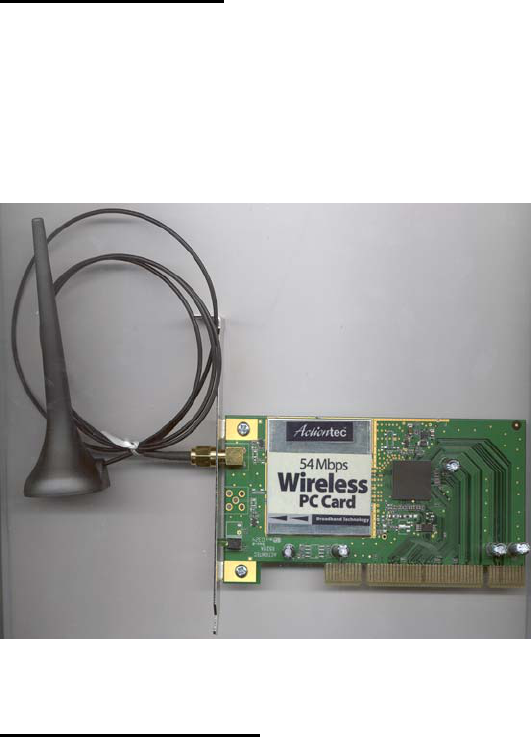Actiontec Electronics 802PAG 802.11g 802.11a/g WLAN Dual Band PCI Adapter User Manual ActionTec White Paper
Actiontec Electronics Inc 802.11g 802.11a/g WLAN Dual Band PCI Adapter ActionTec White Paper
Users Manual

USER INSTALLATION
MANUAL
Of Wireless LAN 802.11a/g Dual Band PCI
Adapter
802PAG
Version: 01
Date: 09/03/03
User Manual of Wireless LAN 802.11a/g Dual Band PCI Adapter
2
Contents:
802.11a/g Wireless LAN
- Device Description
- System Requirements
- Windows 2000
- LED Indicator
- Regulatory Compliance Information

User Manual of Wireless LAN 802.11a/g Dual Band PCI Adapter
3
Device Description
The 802PAG is a Wireless PCI adapter to support IEEE 802.11b/g and/or 802.11a
standard. This adapter can be configured to support either 802.11b/g only or 802.11abg
standard.
System Requirements
Desktop PC containing:
- 32-bit PCI Bus slot
- 32 MB memory or greater
- 300 MHz processor or higher
Microsoft Windows 2000 / Windows Me / Windows 98 second Edition / Windows XP /
Windows NT 4.0 (with Service Pack 6)

User Manual of Wireless LAN 802.11a/g Dual Band PCI Adapter
4
Windows 2000
Driver Installation (First-Time Installation)
This section describes the 1st time installation for the driver for Windows 2000.
Insert 802PAG into a PCI Bus slot and follow these steps to install the NDIS driver:
1. Wait for the Found New Hardware Wizard dialog box to display.
2. Click Next to continue.
3. Choose “search for a suitable driver for my device (recommended).”
4. Click Next.
5. Insert the release CD into the CD-ROM drive.
6. Choose Specify a location under “Optional search location.”
7. Click Next to continue.
8. Browse to the NDIS driver directory.
9. Click OK to continue.
10. The NDIS evaluation driver currently does not have a digital signature from
Microsoft. Therefore, Windows 2000 shows a warning message. Click ‘Yes’ to
proceed with driver installation.
11. Click Finish to complete the driver installation.

User Manual of Wireless LAN 802.11a/g Dual Band PCI Adapter
5
ACU Installation and Driver Update
There is an InstallShield utility to upgrade the NDIS driver, if a previous release is
installed, and to install the Atheros Client Utility (ACU).
When an NDIS driver has been previously installed, insert the 802PAG into a PCI Bus.
Follow these steps to update the NDIS driver:
1. Open the InstallShield Wizard (setup.exe).
2. Click Next to continue.
3. Click ‘Yes’ to accept the License Agreement.
4. The Setup Type page provides selections as summarized in Table 1.
Choose the selection appropriate for your network.
Table 1. Setup Type Page Selections
Selection Description
Install Driver and ACU Recommended. Updates driver and
installs the ACU.
Install Driver Only Installs NDIS driver only
Install ACU Only Installs ACU only.
Make Driver Installation Diskettes Creates ACU installation diskettes.
5. Click Next to continue.
6. Choose the destination location. Click Next to continue.
7. Specify the program folder to store start icons.
8. Use the checkbox to enable the ACU tray icon and start the ACU when restarting
the system. The tray icon will appear in the Windows System Tray.
9. If a previous release of the ACU is installed, make sure it isnot currently running.
Click Next to continue
If you are running a previous version of the ACU, a dialog box will appear
requesting an exit from the program. Click OK and continue.
10. The Atheros NDIS evaluation driver currently does not have a digital signature
from Microsoft, so Windows 2000 may show a warning message. Click Yes to
proceed with driver installation.
11. Click Finish when the InstallShield Wizard is complete.
User Manual of Wireless LAN 802.11a/g Dual Band PCI Adapter
6
Driver and ACU uninstallation
This section provides information about uninstallation procedures.
To uninstall the ACU and the NDIS driver:
Use the InstallShield Updater to uninstall the NDIS driver and ACU application and
remove them from the Device Manager.
1. Open the InstallShield Wizard (setup.exe).
2. Click Next to continue.
3. Click ‘Yes’ to accept the License Agreement.
4. On the Setup Type page, choose Uninstall Driver and Applications to uninstall
drivers and ACU. Click Next to contine.
5. Click Finish when the InstallShield Wizard is complete.
Some files left on the system to ease reinstallation. Use the following instruction to
completely remove these files.
1. Go to the Start menu and choose Search For Files or Folder…
2. Enter oem*.inf in the “Search for files or folders named “field”, and enter
Atheros in the “Containing text:” field.
3. Click Search Now.
A few files matching these criteria are possible, if previous drivers have not been
removed properly.
4. Choose the files that have been found and delete them from the system.
5. To complete the uninstallation, remove the file ar5211.sys from the
\WINNT\system32\drivers folder.
Device Configuration
Use the ACU to configure the device driver. The ACU provides extensive online help to
aid in configuring the device.
Access ACU by clicking the Start button and choosing Programs > Atheros >ACU. The
ACU tray icon is displayed in the right side of the Toolbar. Launch the ACU by double-
clicking the tray icon, or by right-clicking the tray icon and selecting Launch Station
utility.

User Manual of Wireless LAN 802.11a/g Dual Band PCI Adapter
7
LED Indicator
There are two LED indicators.
LED Functionality
LED0
(Power)
LED1
(Netowrk)
Meaning Comments
Slow-rate
blink
OFF Power save mode
(default from power up
or reset)
ON OFF Awake The hardware automatically
enter this state after exit from
power save mode before any
other activity. Changes from
power save mode to this state
might not be visible on the
LEDs if the software assumes
control of the LED blinking by
writing to the PCI
configuration register.
Alternate
blink
Alternate
blink
Looking for network
association
Power LED goes ON;
Network LED is OFF;
then Power LED goes OFF and
Network LED goes ON
Slow-rate
blink
Slow-rate
blink
Associated or joint with
network; no activity
Fast-rate
blink
Fast-rate
blink
Associated or joint with
network; blink rate
increases with activity
on the network over the
air or locally on the
network device based on
setting of the PCI
configuration register
OFF OFF No power applied to the
card

User Manual of Wireless LAN 802.11a/g Dual Band PCI Adapter
8
Regulatory Compliance Information
Radio Frequency Interference Requirements
This device is restricted to indoor use due to its operations in the 5.15 to 5.25
GHz frequency range. FCC requires this product to be used indoors for the
frequency range 5.15 to 5.25 GHz to reduce the potential for harmful interference
to co-channel Mobile Satellite systems.
High power radars are allocated as primary users of the 5.25 to 5.35 GHz and
5.65 to 5.85 GHz bands. These radar stations can cause interference with and/or
damage this device.
Declaration of Conformity
We, Actiontec Electronics, Inc. located in
760 North Mary Ave., Sunnyvale, CA 94086 USA
declare under our sole responsibility that the product 802PAG – 802.11a/b/g Dual
Band PCI Adapter complies with Part 15 of FCC rules. Operation is subject to
the following two conditions:
(1) This device may not cause harmful interference, and
(2) This device must accept any interference received, including interference
that my cause undesired operation.

User Manual of Wireless LAN 802.11a/g Dual Band PCI Adapter
9
FCC Warning
This equipment has been tested and found to comply with the limits for a Class B
digital device, pursuant to Part 15 of the FCC Rules. These limits are designed to
provide reasonable protection against harmful interference in a residential
installation. This equipment generates, uses, and can radiate radio frequency
energy and, if not installed and used in accordance with the instructions, may
cause harmful interference to radio communications. However, there is no
guarantee that interference will not occur in a particular installation. If this
equipment does cause harmful interference to radio or television reception, with
can be determined by turning the equipment off and on, the user is encouraged to
try to correct the interference by one or more of the following methods:
- Reorient or relocate the receiving antenna.
- Increase the separation between the equipment and the receiver.
- Connect the equipment into an outlet on a circuit different from that which
the receiver is connected.
- Consult the dealer or an experienced radio/TV technician for help.
Modifications made to the product, unless expressly approved by Actiontec
Electronics, Inc. could void the user’s authority to operate the equipment.
Important Note:
To comply with FCC RF exposure compliance requirements the antennas used for
this transmitter must be installed to provide a separation distance of at least 20 cm
from all persons and must not be co-located or operating in conjunction with any
other antenna or transmitter.
For questions regarding your product, or the FCC declaration, please contact:
Actiontec Electronics, Inc
760 North Mary Ave,
Sunnyvale, CA 94086
United States
Phone 408-752-7700
Fax 408-732-0087
Email www.actiontec.com